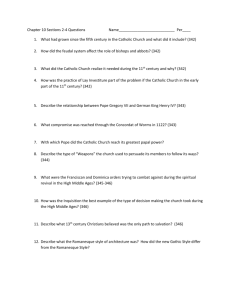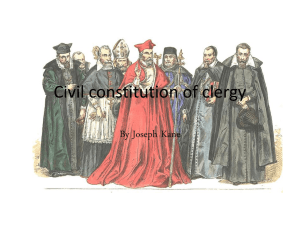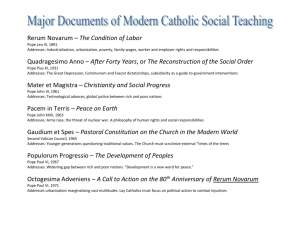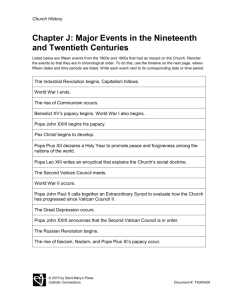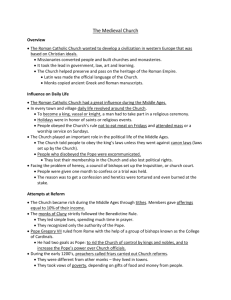Participation - Catholic Charities of St. Paul and Minneapolis
advertisement
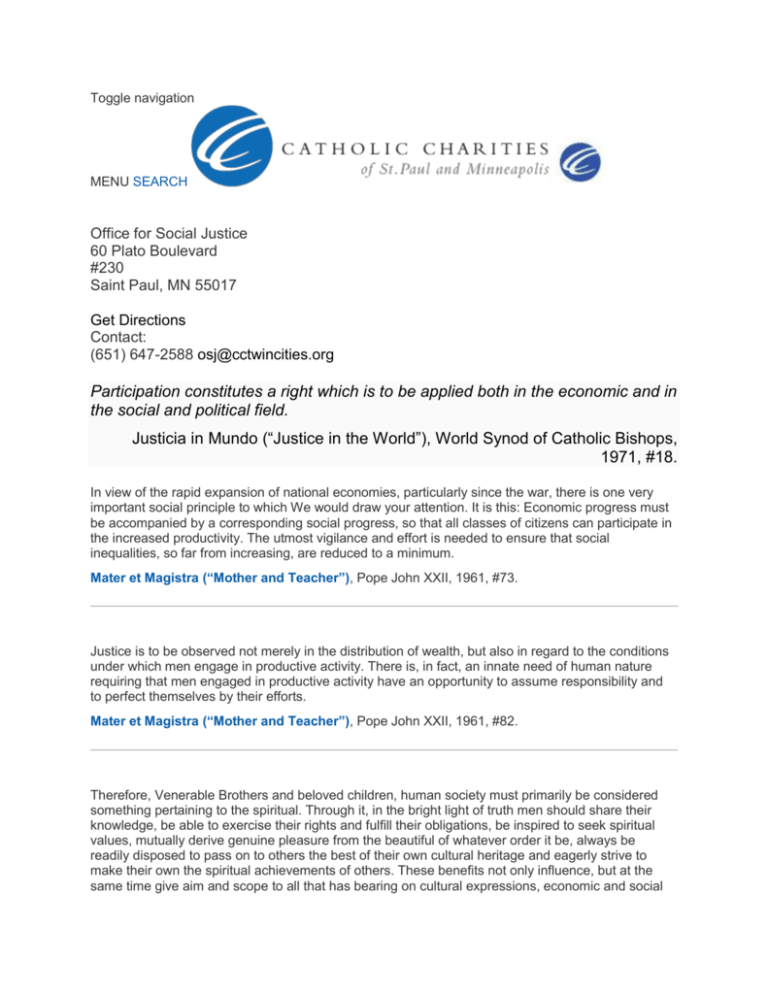
Toggle navigation MENU SEARCH PARTICIPATION Office for Social Justice 60 Plato Boulevard #230 Saint Paul, MN 55017 Get Directions Contact: (651) 647-2588 osj@cctwincities.org Participation constitutes a right which is to be applied both in the economic and in the social and political field. Justicia in Mundo (“Justice in the World”), World Synod of Catholic Bishops, 1971, #18. In view of the rapid expansion of national economies, particularly since the war, there is one very important social principle to which We would draw your attention. It is this: Economic progress must be accompanied by a corresponding social progress, so that all classes of citizens can participate in the increased productivity. The utmost vigilance and effort is needed to ensure that social inequalities, so far from increasing, are reduced to a minimum. Mater et Magistra (“Mother and Teacher”), Pope John XXII, 1961, #73. Justice is to be observed not merely in the distribution of wealth, but also in regard to the conditions under which men engage in productive activity. There is, in fact, an innate need of human nature requiring that men engaged in productive activity have an opportunity to assume responsibility and to perfect themselves by their efforts. Mater et Magistra (“Mother and Teacher”), Pope John XXII, 1961, #82. Therefore, Venerable Brothers and beloved children, human society must primarily be considered something pertaining to the spiritual. Through it, in the bright light of truth men should share their knowledge, be able to exercise their rights and fulfill their obligations, be inspired to seek spiritual values, mutually derive genuine pleasure from the beautiful of whatever order it be, always be readily disposed to pass on to others the best of their own cultural heritage and eagerly strive to make their own the spiritual achievements of others. These benefits not only influence, but at the same time give aim and scope to all that has bearing on cultural expressions, economic and social institutions, political movements and forms, laws, and all other structures by which society is outwardly established and constantly developed. Pacem in Terris (“Peace on Earth”), Pope John XXIII, 1963, #36. Individual citizens and intermediate groups are obliged to make their specific contributions to the common welfare. One of the chief consequences of this is that they must bring their own interests into harmony with the needs of the community, and must contribute their goods and their services as civil authorities have prescribed, in accord with the norms of justice and within the limits of their competence. Pacem in Terris (“Peace on Earth”), Pope John XXIII, 1963, #53. The very nature of the common good requires that all members of the state be entitled to share in it, although in different ways according to each one’s tasks, merits and circumstances. For this reason, every civil authority must take pains to promote the common good of all, without preference for any single citizen or civic group. Pacem in Terris (“Peace on Earth”), Pope John XXIII, 1963, #56. It is also demanded by the common good that civil authorities should make earnest efforts to bring about a situation in which individual citizens can easily exercise their rights and fulfill their duties as well. For experience has taught us that, unless these authorities take suitable action with regard to economic, political and cultural matters, inequalities between the citizens tend to become more and more widespread, especially in the modern world, and as a result human rights are rendered totally ineffective and the fulfillment of duties is compromised. Pacem in Terris (“Peace on Earth”), Pope John XXIII, 1963, #63. It is in keeping with their dignity as persons that human beings should take an active part in government, although the manner in which they share in it will depend on the level of development of the country to which they belong. Men will find new and extensive advantages in the fact that they are allowed to participate in government. In this situation, those who administer the government come into frequent contact with the citizens, and it is thus easier for them to learn what is really needed for the common good. And since public officials hold office only for a specified period of time their authority, far from withering, rather takes on a new vigor in a measure proportionate to the development of human society. Pacem in Terris (“Peace on Earth”), Pope John XXIII, 1963, #73-74. [A] sense of responsibility will not be achieved unless people are so circumstanced that they are aware of their dignity and are capable of responding to their calling in the service of God and of humanity. For freedom is often crippled by extreme destitution, just as it can wither in an ivory tower isolation brought on by overindulgence in the good things of life. It can, however, be strengthened by accepting the inevitable constraints of social life, by undertaking the manifold demands of human relationships, and by service to the community at large. All should therefore be encouraged to play their part in communal enterprises. One must pay tribute to those nations whose systems permit the largest possible number of the citizens to take part in public life in a climate of genuine freedom. Gaudium et Spes (“The Church in the Modern World”), Vatican II, 1965, #31. Sometimes conditions of life and work are such as to stifle people’s cultural activities and take away their appetite for culture. This holds true especially for those living in rural areas and for manual workers who ought to be provided with working conditions conducive to their cultural development. At present women are involved in nearly all spheres of life: they ought to be permitted to play their part fully in ways suited to their nature. It is up to everyone to see to it that women’s specific and necessary participation in cultural life be acknowledged and developed. Gaudium et Spes (“The Church in the Modern World”), Vatican II, 1965, #60. Economic development must remain under the people’s control; it is not to be left to the judgment of a few individuals or groups possessing too much economic power, nor to the political community alone, nor to a few powerful nations. It is proper, on the contrary, that at every level the largest number of people have an active share in directing that development. Catholic Charities serves those most in need. We are a leader at solving poverty, creating opportunity, and advocating for justice in the community Gaudium et Spes (“The Church in the Modern World”), Vatican II, 1965, #65. Citizens, on the other hand, should remember that it is their right and duty, which is also to be recognized by the civil authority, to contribute to the true progress of their own community according to their ability. Especially in underdeveloped areas, where all resources must urgently be employed, those who hold back their unproductive resources or who deprive their community of the material or spiritual aid that it needs –saving the personal right of migration — gravely endanger the common good. Gaudium et Spes (“The Church in the Modern World”), Vatican II, 1965, #65. It is fully in accord with human nature that politico-juridical structures be devised which will increasingly and without discrimination provide all citizens with effective opportunities to play a free, active part in the establishment of the juridical foundations of the political community, in the administration of public affairs, in determining the aims and the terms of reference of public bodies, and in the election of political leaders. All citizens ought to be aware of their right and duty to promote the common good by casting their votes. The church praises and esteems those who devote themselves to the public good and who take upon themselves the burdens of public office in order to be of service. Gaudium et Spes (“The Church in the Modern World”), Vatican II, 1965, #75. But each man is a member of society. He is part of the whole of mankind. It is not just certain individuals, but all men who are called to this fullness of development. Civilizations are born, develop and die. But humanity is advancing along the path of history like the waves of a rising tide encroaching gradually on the shore. We have inherited from past generations, and we have benefited from the work of our contemporaries: for this reason we have obligations towards all, and we cannot refuse to interest ourselves in those who will come after us to enlarge the human family. The reality of human solidarity, which is a benefit for us, also imposes a duty. Populorum Progressio (“On the Development of Peoples”), Pope Paul VI, 1967, #17. John XXIII gave a reminder of the urgency of giving everyone who works his proper dignity by making him a true sharer in the work he does with others: ” every effort should be made that the enterprise become a community of persons in the dealings, activities and standing of all its members”. Populorum Progressio (“On the Development of Peoples”), Pope Paul VI, 1967, #28. While scientific and technological progress continues to overturn man’s surroundings, his patterns of knowledge, work, consumption and relationships, two aspirations persistently make themselves felt in these new contexts, and they grow stronger to the extent that he becomes better informed and better educated: the aspiration to equality and the aspiration to participation, two forms of man’s dignity and freedom. Octogesima Adveniens (“A Call to Action”), Pope Paul VI, 1971, #22. The two aspirations, to equality and to participation, seek to promote a democratic type of society. Various models are proposed, some are tried out, none of them gives complete satisfaction, and the search goes on between ideological and pragmatic tendencies. The Christian has the duty to take part in this search and in the organization and life of political society. Octogesima Adveniens (“A Call to Action”), Pope Paul VI, 1971, #24. The quality and the truth of human relations, the degree of participation and of responsibility, are no less significant and important for the future of society than the quantity and variety of the goods produced and consumed. Octogesima Adveniens (“A Call to Action”), Pope Paul VI, 1971, #41. Participation constitutes a right which is to be applied both in the economic and in the social and political field. Justicia in Mundo (“Justice in the World”), World Synod of Catholic Bishops, 1971, #18. In order that the right to development may be fulfilled by action: (a) people should not be hindered from attaining development in accordance with their own culture; (b) through mutual cooperation, all peoples should be able to become the principal architects of their own economic and social development. Justicia in Mundo (“Justice in the World”), World Synod of Catholic Bishops, 1971, #71. The exercise of solidarity within each society is valid when its members recognize one another as persons. Those who are more influential, because they have a greater share of goods and common services, should feel responsible for the weaker and be ready to share with them all they possess. Those who are weaker, for their part, in the same spirit of solidarity, should not adopt a purely passive attitude or one that is destructive of the social fabric, but, while claiming their legitimate rights, should do what they can for the good of all. The intermediate groups, in their turn, should not selfishly insist on their particular interests, but respect the interests of others. Solicitudo Rei Socialis (“On Social Concern,” Donders translation), Pope John Paul II, 1987, #39. For the “health” of a political community as expressed in the free and responsible participation of all citizens in public affairs, in the rule of law and in respect for and promotion of human rights is the necessary condition and sure guarantee of the development of “the whole individual and of all people”. Solicitudo Rei Socialis (“On Social Concern,” Donders translation), Pope John Paul II, 1987, #44. These fundamental duties can be summarized this way: basic justice demands the establishment of minimum levels of participation in the life of the human community for all persons. The ultimate injustice is for a person or group to be treated actively or abandoned passively as if they were nonmembers of the human race. To treat people this way is effectively to say they simply do not count as human beings. Economic Justice for All, U.S. Catholic Bishops, 1986, #77. The founders [of the United States] took daring steps to create structures of participation, mutual accountability, and widely distributed power to ensure the political rights and freedoms of all. We believe that similar steps are needed today to expand economic participation, broaden the sharing of economic power, and make economic decisions more accountable to the common good. Economic Justice for All, U.S. Catholic Bishops, 1986, #297. Parishes need to promote a revived sense of political responsibility calling Catholics to be informed and active citizens, participating in the debate over the values and vision that guide our communities and nation. Parishes as local institutions have special opportunities to develop leaders, to promote citizenship, and to provide forums for discussion and action on public issues…Parishes can help lift up the moral and human dimension of public issues, calling people to informed participation in the political process. Communities of Salt and Light, National Conference of Catholic Bishops, 1993. Respecting and responding to the cultural and ethnic diversity of the communities we serve is an expression of justice. Recognizing the contributions and welcoming the participation of all members of the parish whatever their race, gender, ethnic background, nationality, or disability-these are integral elements of parishes seeking justice. Communities of Salt and Light, National Conference of Catholic Bishops, 1993. The direct duty to work for a just ordering of society, on the other hand, is proper to the lay faithful. As citizens of the State, they are called to take part in public life in a personal capacity. So they cannot relinquish their participation “in the many different economic, social, legislative, administrative and cultural areas, which are intended to promote organically and institutionally the common good.” The mission of the lay faithful is therefore to configure social life correctly, respecting its legitimate autonomy and cooperating with other citizens according to their respective competences and fulfilling their own responsibility. Deus Caritas Est (“God is Love”), Pope Benedict XVI, 2005 #29. In the Catholic Tradition, responsible citizenship is a virtue, and participation in political life is a moral obligation. This obligation is rooted in our baptismal commitment to follow Jesus Christ and to bear Christian witness in all we do. As the Catechism of the Catholic Church reminds us, “It is necessary that all participate, each according to his position and role, in promoting the common good. This obligation is inherent in the dignity of the human person. . . . As far as possible citizens should take an active part in public life” (nos. 1913-1915). Forming Consciences for Faithful Citizenship, U.S. Conference of Catholic Bishops (USCCB), 2007, #13. How we organize our society—in economics and politics, in law and policy—directly affects the common good and the capacity of individuals to develop their full potential. Every person and association has a right and a duty to participate actively in shaping society and to promote the wellbeing of all, especially the poor and vulnerable. Forming Consciences for Faithful Citizenship, U.S. Conference of Catholic Bishops (USCCB), 2007, #47. Paul VI had an articulated vision of development. He understood the term to indicate the goal of rescuing peoples, first and foremost, from hunger, deprivation, endemic diseases and illiteracy. From the economic point of view, this meant their active participation, on equal terms, in the international economic process; from the social point of view, it meant their evolution into educated societies marked by solidarity; from the political point of view, it meant the consolidation of democratic regimes capable of ensuring freedom and peace. Caritas in Veritate (“In Charity and Truth”), Pope Benedict XVI, 2009, #21. Subsidiarity is first and foremost a form of assistance to the human person via the autonomy of intermediate bodies. Such assistance is offered when individuals or groups are unable to accomplish something on their own, and it is always designed to achieve their emancipation, because it fosters freedom and participation through assumption of responsibility. Subsidiarity respects personal dignity by recognizing in the person a subject who is always capable of giving something to others. Caritas in Veritate (“In Charity and Truth”), Pope Benedict XVI, 2009, #57. Economic aid, in order to be true to its purpose, must not pursue secondary objectives. It must be distributed with the involvement not only of the governments of receiving countries, but also local economic agents and the bearers of culture within civil society, including local Churches. Aid programmes must increasingly acquire the characteristics of participation and completion from the grass roots. Indeed, the most valuable resources in countries receiving development aid are human resources: herein lies the real capital that needs to accumulate in order to guarantee a truly autonomous future for the poorest countries. Caritas in Veritate (“In Charity and Truth”), Pope Benedict XVI, 2009, #58. Each individual Christian and every community is called to be an instrument of God for the liberation and promotion of the poor, and for enabling them to be fully a part of society. Evangelii Gaudium (“The Joy of the Gospel”), Pope Francis, 2013, #187. Yet we desire even more than this; our dream soars higher. We are not simply talking about ensuring nourishment or a “dignified sustenance” for all people, but also their “general temporal welfare and prosperity”. This means education, access to health care, and above all employment, for it is through free, creative, participatory and mutually supportive labour that human beings express and enhance the dignity of their lives. Evangelii Gaudium (“The Joy of the Gospel”), Pope Francis, 2013, #192. A consumerist vision of human beings, encouraged by the mechanisms of today’s globalized economy, has a levelling effect on cultures, diminishing the immense variety which is the heritage of all humanity. Attempts to resolve all problems through uniform regulations or technical interventions can lead to overlooking the complexities of local problems which demand the active participation of all members of the community. Laudato Si’ (“Praise Be”), Pope Francis, 2015, Chapter 4, #144. A consensus should always be reached between the different stakeholders, who can offer a variety of approaches, solutions and alternatives. The local population should have a special place at the table; they are concerned about their own future and that of their children, and can consider goals transcending immediate economic interest. We need to stop thinking in terms of “interventions” to save the environment in favour of policies developed and debated by all interested parties. The participation of the latter also entails being fully informed about such projects and their different risks and possibilities; this includes not just preliminary decisions but also various follow-up activities and continued monitoring. Honesty and truth are needed in scientific and political discussions; these should not be limited to the issue of whether or not a particular project is permitted by law. Laudato Si’ (“Praise Be”), Pope Francis, 2015, Chapter 5, #183. POVERTY FOR NO ONE. OPPORTUNITY FOR EVERYONE. IT STARTS WITH YOU. MAKE A DONATION TAKE ACTION Donate Volunteer Advocate INSIDE CATHOLIC CHARITIES What We Do Education & Advocacy Our Organization WE CAN HELP Find Help All Locations Contact SIGN UP FOR OUR ENEWS: Catholic Charities 1200 2nd Ave. South Minneapolis, MN 55403 612.204.8500 info@cctwincities.org © 2015 Catholic Charities of St. Paul and Minneapolis Privacy PolicySite Map

